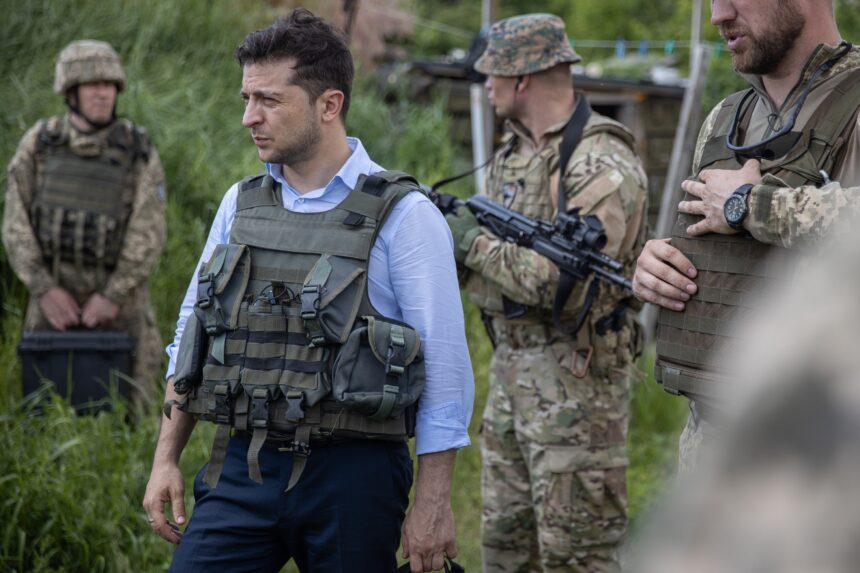In his latest interview for Serbia’s top-rated Happy TV channel, Srdja Trifkovic dwells on the military and political dynamics after 111 days of the conflict in Ukraine. Since Dr. Trifkovic was speaking from Switzerland, via Skype, the first question was whether the crisis over Ukraine has prompted the Alpine country to abandon its traditional policy of neutrality. Trifkovic’s response to that and other questions follows in the transcript below, translated from Serbian and abbreviated.
There is no doubt that Switzerland is fully aligned with the political West. At the same time, [the country] has no intention to be integrated either into the European Union or NATO. [Switzerland sees] considerable advantages in staying out of both. This applies especially to the European Union, which is increasingly developing into a neo-totalitarian institution which seeks to diminish the identity and sovereignty of smaller member-nations. It is truly impressive that Hungary’s Prime Minister Viktor Orbán has successfully resisted the attempt by unelected nobodies in Brussels to impose their diktat. They are embodied in Ursula von der Layen, who represents no one but her bosses in Berlin and the “Davos Politburo.”
The European project will plunge into a deep crisis by the end of this year, however. The EU has harmed itself far more than it has damaged Russia with the six packages of sanctions which have been adopted so far. The winners thus far are the global hegemonists in Washington, who now have the EU under far firmer control than at any time during the Cold War. The main beneficiary, though, is Xi Jinping and the People’s Republic of China. In the global geopolitical balance of power, China will draw substantial profits from the current crisis.
As for Europe—which has been talking for years and decades about the common foreign and security policy—it is now but a pathetic underling of the trans-Atlantic hegemon. This reminds us of Walter Ulbricht, Todor Zhivkov, and János Kádár, who were likewise Leonid Brezhnev’s pliant subordinates half a century ago …
The [London] Sunday Times has just published a long and interesting interview with Dr. Henry Kissinger [by] the prominent British historian Niall Ferguson, who has also written a book about Kissinger. [Kissinger] said that Zelensky was an “accidental president,” who was elected because the Ukrainians were fed up with the endemic corruption which has continued even after the Maidan. Indeed, it turned out that one corrupt team, led by the former president, Viktor Yanukovych, was merely replaced by another corrupt team, the one which had claimed to be inspired by “European values.”
His formal role and comic aspects notwithstanding, Zelensky is merely the transmission of his mentors across the Atlantic. Their ostensible displeasure, caused by his alleged failure to keep them fully informed about the actual state of play along the front lines, should not be taken too seriously. Both Kiev and L’vov are full of British, Polish, Lithuanian, and also, of course, American operatives and instructors, who in reality have a great deal of operative control over Ukrainian units.
In that context, let me add that in spite of the slow advance of Russian forces in the execution of “Plan B” in the east—after the failure of their initial attempt to advance on five fronts at once—sooner or later, they will grind down the Ukrainian forces. Zelensky himself stated recently that the Armed Forces of Ukraine were losing 20,000 men a month, which includes those killed, wounded, taken prisoner, sick, and missing.
The ongoing massive influx of Western arms cannot be easily absorbed, especially those complex weapons systems which require a long period of training. Some of those deliveries, on the other hand, include often poorly stored and maintained weaponry left from the East German Volksarmee. Either way, those weapons deliveries provide the political West with an alibi of sorts for its willingness to fight the Russians to the last Ukrainian, but without ever committing its own forces. They don’t mind the death of thousands of Ukrainian young men—Orthodox, Uniate, and Catholic—to weaken Russia without being directly engaged.
They may be making a miscalculation, however. Stalin thought in 1939 that Britain and France on one side and Germany on the other would exhaust themselves fighting each other, but then in the spring of 1940, France suddenly collapsed after only three weeks. Likewise, I think that we may witness a sudden collapse of Ukrainian resistance, especially on the southwestern flank running from Nikolaev to Odessa and Budjak, and east of the Dnieper River. If that happens, we will see what is the Western “Plan B.”
I don’t believe anyone is willing to up the ante to the point where there would be a danger of nuclear escalation. There may be some hotheads in Warsaw, Riga, Tallinn, who would be willing to take that risk, perhaps in Bucharest as well, but mercifully they are not to be found in Washington or Berlin.
Image: Ukrainian President Volodymyr Zelensky (President.gov.ua / via Wikimedia Commons, CC BY 4.0)

Leave a Reply